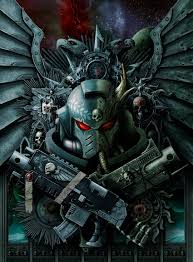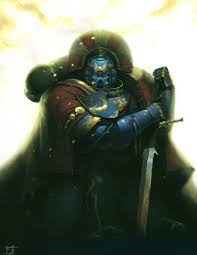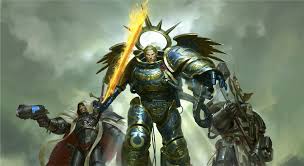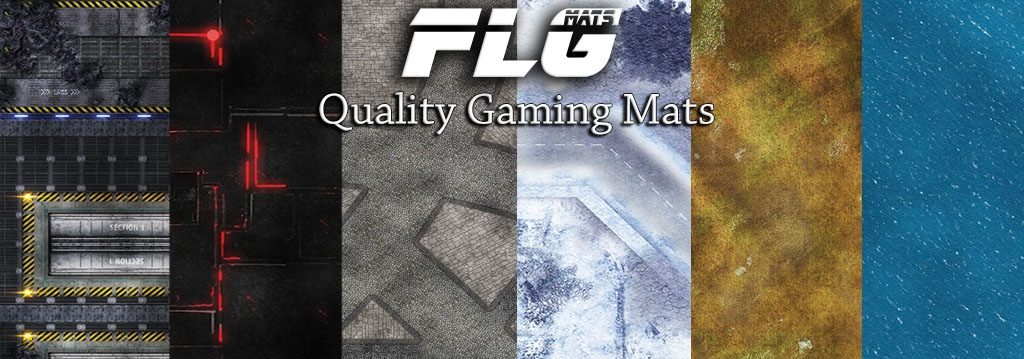Welcome to the continuing breakdown of the 2020 9th edition Codex Space Marines. Today we will be looking over the 12 generic warlord traits, as well as the Chapter specific ones. I originally was going to do the relics as well, but the Warlord traits took me longer than expected. Relics next.

Ranking System
- Competitive: This is a codex entry (unit, stratagem, item, etc.) that has a place in essentially any competitive list built with this faction regardless of unit choices or is the source of a significant force multiplication effect for other units.
- Efficient: This is a codex entry that can stand on its own merit in a matched play list but works best when combo’d up with other units or in specific situations to become very powerful but may not always be seen.
- Situational: This is a codex entry that may not pass as competitive on its own merits but can be made effective in a creative list, as a meta-buster, or in a specific combo or scenario where it ratchets up in power to potentially very high strength but otherwise will not be seen very often.
Space Marine Warlord Traits
The following Warlord Traits (WL) are available to any Adeptus Astartes (read: Space Marine) Character who you choose to have as a warlord, either for your battle forged army or by using Hero of the Chapter Strat. Note that Named Characters may not select these, but will have one specified for them. In a beautiful clarity, GW has also listed if an ability is an Aura, which will help clarify rules interactions.
- Fear Made Manifest (Aura) – This ability has two parts, both dealing with Morale checks. Firstly, Enemy units within 6″ suffer a -1 to their Leadership (LD). Secondly, when making a combat attrition test, the Enemy units subtract one from the rolls made. Meaning that for a unit not under half strength, a 1 or 2 will see a model run, while a 1, 2, or 3 will for a unit under half strength. This trait is not terrible, and if LD and Combat attrition tests mattered more, this could see some play. Unfortunately the other traits are simply much better, enemy units often have ways to bypass or negate LD tests, and other traits offer better buffs or more damage potential. Situational
- The Imperium’s Sword – While I typically am not a huge fan of traits that only benefit the wielder, for this one I make an exception. It allows the wielder to re-roll the charge roll (both dice). In addition, on the first round of combat, you get to add one to your Strength (STR) and Attacks. This opens up some nice combos for some beat-stick characters. The two that most gravitate towards are the Chaplain on Bike and the Jump Captain. Jump Captain with Burning Blade and this trait has 6 attacks at STR 8, ap -5 and 2 damage a pop for 115 pts. The Chaplain, clocking in at 115 as well, can, with the Mantra of Strength Litany, and the Benediction of Fury Relic, can also do 6 attacks at STR 7, but ap -2 and 4 damage. Both variants are able to benefit from Might of Heroes Psychic power, for an additional attack and strength (and toughness too). All of this combines to make some high damage potential. Since SM players can also use Hero of the Chapter to pick up additional traits, and / or use Supplements to double WL traits on a single character, which can open some interesting combos. This is one to always expect to see. Competitive
- Iron Resolve – This WL trait also only applies to the Warlord. It increases the wounds by one, and grants a 6+++. While this is not amazing, there are some builds to make a tanky HQ. Probably my favorite is a Salamanders build, using a Chapter Master on a bike, with the Angel Artifice relic and Forge Master trait as well, can see him T8 with 8 wounds, a 2+/5++/6+++. Might of Heroes and Drakeskin can push him up 1 toughness each, while Flame Shield can offer -1 to hit. All of this is a lot of resources to make a nigh unkillable speedy unit to move around taking objectives and harassing units. Even outside such an extreme and limited build, combining the Angel Artifice relic with this trait does offer a good bit of durability to any character. Efficient
- Champion of Humanity – A more specific beat stick trait. This one is all build around being near enemy Characters. The WL gets to add one to it’s attacks while within engagement range of an enemy character, and also gets to add one to it’s hit and wound roll against characters. in melee This is not terrible, but it is harder to pull off. Most melee characters are already hitting on 2+, so it would see most play on a Thunder Hammer wielding character. There could be some play on a Chapter Champion, leaning hard into killing characters. Getting Re-roll wounds and +1 to wound vs them, while having increased heroic intervention range and always striking first means it could be quite useful if hero hammer becomes a real thing again. Efficient
- Storm of Fire (Aura) – This WL trait allows all CORE units within 6″ to, on a natural wound roll of a 6, increase their AP by 1 with shooting attacks. Doctrines have shown how much additional AP can add up, and my first thought is Imperial Fists with Heavy Intercessors with Hellstorm Bolt Rifles. 30 shots out of a 10 man squad, with exploding 6’s, should see a couple shots move up to AP 1. Likewise, Aggressors could be a good unit for this. Overall though, this seems to be a trait that wants to use massed firepower to really benefit from. Most all the massed firepower that SM has is geared towards Str 4/5 weapons with little to no innate AP. I don’t think those targets are ones that Marines in general struggle with. It can be used to create a very solid shooting core, but it does not add much that is otherwise lacking. Efficient
- Rites of War (Aura) – Any friendly CORE or CHARACTER unit within 6″ gains the Objective Secured ability (ObSec). This is interesting… It is easier to list what is not core or Character for SM. Namely, Vehicles and Centurions. This offers a wide range of options to benefit from this aura. Considering how important taking and holding objectives are now in 9th, this has good potential. Terminators especially seem to want this, and Dark Angels Terminators even more so. Having the potential to throw 10 bodies on an objective, with inbuilt Transhuman and 3 wounds a pop on a 2+/5++. This is not a bad trait at all, but it does compete with Steadfast Example on a Chapter Ancient. I actually like it better on the Ancient, as on there, it also counts models that already have ObSec as counting double. The difference is the Ancient won’t also have Characters count. If you are needing more ObSec bodies, there is certainly some play here and I can see players gravitating towards this as 9th continues to develop. If it is taken as Rites of War or Steadfast Example, will depend a bit on the exact army composition, but overall it’s an Efficient choice
Vanguard Warlord Traits

If your Warlord is a Phobos Character, you may elect to take one of the below traits. Most of these impact Phobos units only, which limits them a good deal. Phobos units are: Captain/Librarian/Lieutenant in Phobos Armor, Infiltrators, Incursors, Reivers and Eliminators. This is a list that is just smaller than the Harlequin Codex. With Reivers still not being good, and Infiltrators and Incursors costing a pretty penny for middling damage out put, most Phobos units are a tad lack luster. This combination of mediocre units and limited pool makes the following Warlord Traits all quite limited in scope.
- Shoot and Fade – Once per turn, your Warlord may select a Phobos unit within 6″, and after it ha shot, it may make a normal or advance move. It may not declare any charges that turn. Normally I like extra movement shenanigans, and this is probably one of the best on this list. If it could be used on a bulky unit, like terminators, it could be really good. Limited to just phobos units though really limits its usability. The unit that wanted to use this the most was Eliminators, who, now have their own way of getting this ability via a Sargent taking an instigator bolt carbine for no additional cost. Reviers want to be able to charge, and infiltrators and incursors, if you take them, don’t tend to offer a ton of durability to really fling up the board. Finally, there is the fact that you need a character within 6″ to do this, and due to the new character targeting rules in 9th ed, you need to be careful to not advance their screen away from themselves. It is certainly usable, but there are better traits, better ways to get mobility, and better units to use. Situational
- Lord of Deceit – After both players have deployed, you may select up to three Phobos units and redeploy them. They can be placed into strategic reserves without having to spend the CP to do so. This, at first, seems really really powerful. Phobos units tend to be able to deploy aggressively outside of your deployment zone. This lets you do so, force your opponent to deploy in reaction to them, then redeploy those units if needed. The issue with this is, you now do this after deployment, but before seeing who goes first. I am not sure if this was the intent of the writers or not… Codex states, “After both players have deployed” which is step 11, deploy armies. Step 12 is Determine first turn, and step 13 is Resolve pre-battle abilities, which reads, “Players alternate resolving any pre-battle abilities units in their army may have, and resolving any Stratagems that are used before the battle (excluding those that upgrade their units or thse that enable them to set up a unit in a location other than the battlefield), starting with the player who will take the first turn.” – pg 282 of the rule book.
Looking at this WL trait, it states you activate it after deployment. Step 13 is after step 11, so that would check out. However, step 13 states that abilities which allow for placing units into reserves are not used during that step, and Lord of Deceit does indeed allow for a unit to be placed into reserve. As such, rules as written, I believe the rule needs to be resolved at the end of step 11 until FAQ’d otherwise.
Again, I must stress, I can not tell the intent of this rule. If this is what was meant by it, or if it was intended to be used in step 13. If it was meant to be used in step 13, knowing who has first turn, this ability is Efficient, otherwise it is Situational.
- Master of the Vanguard (Aura) – This WL trait has two parts. Firstly, it allows units to add 1″ to their Move, Advance, and Fall Back moves while within 6″ of the WL. Secondly, they may add 1 to their charge rolls. This is obviously geared towards a Melee focused army. Lets do a comparison.
Phobos Captain with a unit of Reivers in a Hungry for Battle detachment vs a unit of Outriders and a Chaplain on bike in a White Scars detachment.Captain + 9 Reivers comes out to 257 points. They can move 6″, and charge with a +2″ on the charge with no roll necessary. They put out 37 attacks (str 4, ap 0, 1 damage) on the charge from the Reivers, and 7 more similar attacks from the Captain. Their foot print is rather large, they are vulnerable to blast weapons (although you could take two squads of 5 for a few extra points) and they are rather slow. They do get to advance d6+2 to help move up the board.
Bike Chappy + 3 Outriders comes out to 250 pts. They can move 14″ + d6 advance and still charge. Chaplin can roll his litany for the +2 charge, or may spend CP to ensure it goes off. They get 16 attacks on the charge (str 4, ap -1, 1 damage), as well as the 5+ additional attacks from the Chaplin (str 7+, Ap -1+, a 2+ damage). I am noting all the +’s on the Chaplian as he typically gets decked out with relics and other litanies / powers to buff him up. This combo is a much smaller footprint, much faster, and slightly tougher to kill.
All of this in a long drawn out way to show that the limitation of taking Phobos units hurts what would have been a decnet trait and makes it just ok. Situational
- Stealth Adept – This one is a bit more interesting. Effectively, it allows you to use old Character targeting rules, that your WL can not be targeted unless he is the closest model. So now, you want a character that is either (a) a lynch pin buffing character or (b) able to sit back and fire away with ranged attacks and is a substantive threat. The only units I can really think of to make use of this would be a librarian. All in all though, this does not seem to have a great bit of utility when locked to only Phobos models. Efficient
- Target Priority – This trait allows a single Phobos unit within 6″ be selected to gain +1 to their shooting rolls. With Eliminators loosing the ability to grant this to themselves now, this is mildly interesting on them at least. Everything else though is simply massed STR 4 AP 0 shots. Even with Eliminators, you are boosting the shooting of one, 3 man uni. If this were an ability a Phobos character had instead, it would be pretty good, but the opportunity cost of taking this instead of other options relegates this to being Situational
- Master Marksman – Add one to the damage of non relic or grenade ranges weapons of the bearer. This was what lead to the Ravenguard Sniper captain doing 4 damage, no LoS needed shots. A 4 damage sniper captain is nice, but too often I found in practice that it’s targets had an invul. Even with a 5++ save, it failed more times than I wanted it to, and as such, was not reliable enough to count on. Fun, but not competitive. Situational
I really hate ranking all of these so low, and some of the traits themselves would actually be very good if they were not limited to Phobos only units. Few of them will punish you for choosing them, but the other options available are simply better. I really can not complain though, as like, in all things, marines get so many more options then any one else. It is almost like they are the most profitable for GW or something…
Ah well, moving on to Chapter specific traits. Note that these may have some slight changes when the supplements come out, as we have already seen with the Space Wolves one.
Chapter Warlord Traits

- Dark Angels: Brilliant Strategist – Wow…. as if you didn’t have enough reasons to play Dark Angels, they went ahead and got probably the best Warlord trait. This trait allows you to select a friendly Dark Angels unit (which does not have to be CORE), and effectively roll back the doctrine that unit is considered to be in. This will most often be used on turn 2 and 3 to let a unit move back to the Devastator doctrine. It is worth remembering that in the Dev Doctrine, DA units gain 6″ to their range of Heavy and Rapid fire weapons, while Assault and Pistols gain 3″. Extra range is always good. Add in that all named characters (for now at least) use this trait if you select them as your Warlord, and the availability of the Steady Advance strat (and possibly Rapid Fire too), and you have a very strong, very accurate mobile firebase. I would expect to see Azrael anchoring a firebase, possibly of 10 Heavy Intercessors, or Stalker Bolt Rifle intercessors, or Helbllasters, or Eradicators…. the list goes on. This is a very solid trait, although not one that I think, in and of itself is brokenly powerful. I do think it may get nerfed down to be on par with some other traits we have seen (pick a unit once per battle, and it gets to be in x doctrine). The fact this is not limited to Core units means you can almost always find some unit that want’s this bonus. Competitive
- White Scars: Deadly Hunter – Poor white scars have to try and follow that performance… This trait allows the warlord to select on enemy unit within 1″ of themselves after they make a charge. On a 2+, that unit takes a single mortal wound. Mortals are nice, the damage output from other traits is better. Situational
- Space Wolves: Beastslayer – This trait has been modified in the Space Puppy Codex to include an Sage effect to turn this into an aura as well. Whilst within engagement range of a Monster of Vehicle, the warlord gets +1 to hit and wound, as well as an additional attack. Additional attacks are nice, especially with Wolves getting exploding 6’s. Wolves get some very good combat units that can certainly make use of this, especially if you can activate it’s aura; which is done by your WL destroying one of those types of targets. When it is good, it is very good. Otherwise, it is not great or maybe even useless (although I don’t think many armies will bring no vehicles or monsters whatsoever…) Efficient
- Imperial Fists: Architect of War (Aura) – This WL trait is rather thematic, but requires a few to many hoops to jump through for my liking. When a CORE unit is within 6″, and that unit is receiving the benefits of cover, and that unit is shot at with an AP -1 weapon; then treat the AP as being 0 instead. It fine for castling up, which was the name of the game in 8th ed. This is 9th, and castles are not really that great anymore. At least not at this stage. Situational
- Crimson Fists: Refuse to Die – The first time this WL is slain, you may elect to roll a d6, and on a 4+ it comes back with d3 wounds, as close to where it died as possible, but more than 1″ from enemy models. If you do this, you can not use any other ‘trigger-on-death’ abilities. Ehhhhhh. 50/50 chance of your WL coming back. I’d rather take Iron Resolve and just make him harder to kill… Maybe someone can show me the math that proves this is better.. but I doubt it. Situational
- Black Templars: Oathkeeper – In short, this allows the bearer to Heroically Intervene (HI) 6″. HI has gotten a bit riskier, in that Charging units may now fight against a unit that utilizes it, but it is still quite powerful. With BT now getting access to all the toys in the SM codex, they can make some pretty nice beat-stick characters. Efficient
- Blood Angels: Speed of the Primarch – This WL gets to fight first. Nicer than before, now that opposing player gets to fight first in ongoing combats. The times this will be relevant though, compared to say, The Imperium’s Sword, is few and far between. Take that, or any of several other better traits. Situational
- Flesh Tearers: Merciless Butcher – If there are 5+ enemy units within 3″ of this WL, it gets an extra d3 attacks. Again, I’d rather take The Imperium’s Sword if I want a good melee unit. Sure it is potentially two less attacks, but I don’t need to throw it into large units to trigger it. Situational
- Iron Hands: Adept of the Omnissiah – This WL trait is basically the same as it was before. If a Techmarine, you may heal vehicles for d3+1 wounds. If they are not, they may heal for 1 wound. Ok, I guess. Having Master of the Forge as a 30 pt upgrade to do a flat 3 wounds when healing seems a better deal to me. I guess you could do two Techmarines, one with this and one with Master of the Forge if you were running a heavy Mechanized list of some sort… but that style list does not seem to be great at this time… Situational
- Ultramarines: Adept of the Codex – While this WL is on the field, every time you spend a CP, it gets refunded on a 5+. Decent, not a bad pick. Especially with how much CP you can start with. A babysitting character can pick this up and net you 2-3 CP over the course of the game. Efficient
- Salamanders: Anvil of Strength – The WL gets +2 Str. Simple, straightforward, and pretty decent. Str 10 is pretty easy to achieve on a number of different builds, which, with the increase in T5 models, makes this quite nice. A Burning Blade Captain with this and Imperium Sword makes for quite a deadly (and thematic) unit. Efficient
- Raven Guard: Echo of the Ravenspire – One per battle, this WL can, if it is more than 6″ from enemy models, go into reserves. It may then Deep Strike on the subsequent movement phase. I don’t tend to like going into reserves. I’d rather pay extra for more mobility and stay on the board, taking objectives and pummeling enemy units. It is an ok gimmick, and if it were an innate ability, could see some fringe play, but as one of a few valuable WL traits – pass. Situational
- Deathwatch: Vigilance Incarnate – In your Command Phase, you may select a CORE unit within 6″ and nominate a Battlefield Role (Troops, HQ, etc). Until the start of your next Command Phase, when making an attack, with the selected unit against the nominated role, re-roll wounds of 1. This is not bad. It gives some nice flexibility, and Deathwatch lean heavily into their CORE units. On a Captain, you are getting the re-rolls to hit of 1 as well, which makes for a very effective base. It also works in shooting or combat, further opening up its flexibility. Competitive
And there you have it. All the Warlord traits (other than those as covered in the Chapter Command section). There are a lot of options for different builds, and Marines being able to effectively take 4 traits means you may see some of the more fringe cases being taken and built around, although at the cost of CP, I would doubt many players will take all 4 traits in one army. As more events start happening, it will be interesting to see which traits and combinations open up in unexpected ways.
Next up will be the relics.
Thanks for reading, and happy Wargaming!
And remember, Frontline Gaming sells gaming products at a discount, every day in their webcart!



Storm of Fire does not stack with Doctrines. It says so in the doctrines rule text.
Good catch – thank you. I had not looked at the Doctrines with regards to stacking.